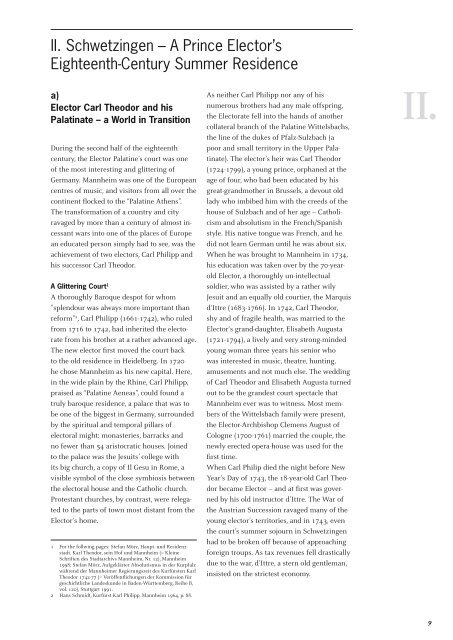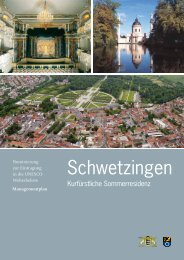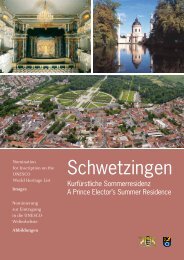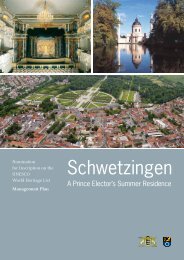II. - Schloss Schwetzingen
II. - Schloss Schwetzingen
II. - Schloss Schwetzingen
You also want an ePaper? Increase the reach of your titles
YUMPU automatically turns print PDFs into web optimized ePapers that Google loves.
<strong>II</strong>. <strong>Schwetzingen</strong> – A Prince Elector’s<br />
Eighteenth-Century Summer Residence<br />
a)<br />
Elector Carl Theodor and his<br />
Palatinate – a World in Transition<br />
During the second half of the eighteenth<br />
century, the Elector Palatine’s court was one<br />
of the most interesting and glittering of<br />
Germany. Mannheim was one of the European<br />
centres of music, and visitors from all over the<br />
continent fl ocked to the “Palatine Athens”.<br />
The transformation of a country and city<br />
ravaged by more than a century of almost incessant<br />
wars into one of the places of Europe<br />
an educated person simply had to see, was the<br />
achievement of two electors, Carl Philipp and<br />
his successor Carl Theodor.<br />
A Glittering Court 1<br />
A thoroughly Baroque despot for whom<br />
”splendour was always more important than<br />
reform” 2 , Carl Philipp (1661-1742), who ruled<br />
from 1716 to 1742, had inherited the electorate<br />
from his brother at a rather advanced age.<br />
The new elector fi rst moved the court back<br />
to the old residence in Heidelberg. In 1720<br />
he chose Mannheim as his new capital. Here,<br />
in the wide plain by the Rhine, Carl Philipp,<br />
praised as “Palatine Aeneas”, could found a<br />
truly baroque residence, a palace that was to<br />
be one of the biggest in Germany, surrounded<br />
by the spiritual and temporal pillars of<br />
electoral might: monasteries, barracks and<br />
no fewer than 54 aristocratic houses. Joined<br />
to the palace was the Jesuits’ college with<br />
its big church, a copy of Il Gesu in Rome, a<br />
visible symbol of the close symbiosis between<br />
the electoral house and the Catholic church.<br />
Protestant churches, by contrast, were relegated<br />
to the parts of town most distant from the<br />
Elector‘s home.<br />
1 For the follwing pages: Stefan Mörz, Haupt- und Residenzstadt.<br />
Karl Theodor, sein Hof und Mannheim (= Kleine<br />
Schriften des Stadtarchivs Mannheim, Nr. 12), Mannheim<br />
1998; Stefan Mörz, Aufgeklärter Absolutismus in der Kurpfalz<br />
während der Mannheimer Regierungszeit des Kurfürsten Karl<br />
Theodor 1742-77 (= Veröffentlichungen der Kommission für<br />
geschichtliche Landeskunde in Baden-Württemberg, Reihe B,<br />
vol. 120), Stuttgart 1991.<br />
2 Hans Schmidt, Kurfürst Karl Philipp, Mannheim 1964, p. 88.<br />
As neither Carl Philipp nor any of his<br />
numerous brothers had any male offspring,<br />
the Electorate fell into the hands of another<br />
collateral branch of the Palatine Wittelsbachs,<br />
the line of the dukes of Pfalz-Sulzbach (a<br />
poor and small territory in the Upper Palatinate).<br />
The elector’s heir was Carl Theodor<br />
(1724-1799), a young prince, orphaned at the<br />
age of four, who had been educated by his<br />
great-grandmother in Brussels, a devout old<br />
lady who imbibed him with the creeds of the<br />
house of Sulzbach and of her age – Catholicism<br />
and absolutism in the French/Spanish<br />
style. His native tongue was French, and he<br />
did not learn German until he was about six.<br />
When he was brought to Mannheim in 1734,<br />
his education was taken over by the 70-yearold<br />
Elector, a thoroughly un-intellectual<br />
soldier, who was assisted by a rather wily<br />
Jesuit and an equally old courtier, the Marquis<br />
d‘Ittre (1683-1766). In 1742, Carl Theodor,<br />
shy and of fragile health, was married to the<br />
Elector‘s grand-daughter, Elisabeth Augusta<br />
(1721-1794), a lively and very strong-minded<br />
young woman three years his senior who<br />
was interested in music, theatre, hunting,<br />
amusements and not much else. The wedding<br />
of Carl Theodor and Elisabeth Augusta turned<br />
out to be the grandest court spectacle that<br />
Mannheim ever was to witness. Most members<br />
of the Wittelsbach family were present,<br />
the Elector-Archbishop Clemens August of<br />
Cologne (1700-1761) married the couple, the<br />
newly erected opera-house was used for the<br />
fi rst time.<br />
When Carl Philip died the night before New<br />
Year’s Day of 1743, the 18-year-old Carl Theodor<br />
became Elector – and at fi rst was governed<br />
by his old instructor d’Ittre. The War of<br />
the Austrian Succession ravaged many of the<br />
young elector’s territories, and in 1743, even<br />
the court’s summer sojourn in <strong>Schwetzingen</strong><br />
had to be broken off because of approaching<br />
foreign troups. As tax revenues fell drastically<br />
due to the war, d’Ittre, a stern old gentleman,<br />
insisted on the strictest economy.<br />
<strong>II</strong>.<br />
9






